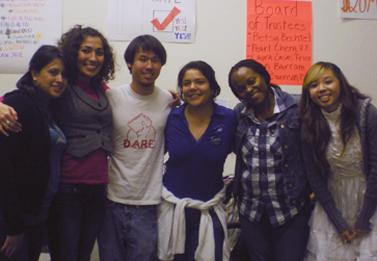 Community colleges respond to $20 million deficit with parcel tax
Community colleges respond to $20 million deficit with parcel tax
Over the last two years, state budget cuts resulted in a $20 million deficit in funding for De Anza and Foothill community college. In response, the Foothill-De Anza Community College District Board of Trustees placed Measure E on the Nov. 2 ballot.
If passed, property owners would contribute $69 annually per parcel. With over 100,000 parcels in the district, the six-year measure would generate approximately $7 million per year for a collective total of $42 million, after which the tax would automatically expire. About 188,000 residents in the district, from Cupertino to Palo Alto and San Jose are eligible to vote on Measure E.
 Unlike the bond measures passed in 1999 and 2006 for infrastructure purposes, Measure E is geared towards academic operations in an effort to address a slew of deficit-induced problems.
Unlike the bond measures passed in 1999 and 2006 for infrastructure purposes, Measure E is geared towards academic operations in an effort to address a slew of deficit-induced problems.
Recent cuts have led to long waiting lists for core classes including math, science and writing that provide acceptable credits for students to transfer to four-year universities. In past years, the two nationally-ranked colleges maintained the ability to open up new sections, but the current deficit translates to lack of both staff and facilities. Though there may be enough students to create a new class, the downsized available resources translates to an overall decrease in course options.
“This year it was about 10,000 students [who] couldn’t get into their classes,” De Anza Student Body (DASB) officer senior Nevin Sarina said. “I can’t even imagine what it [will] look like next year if we don’t give funding back to schools.”
According to Measure E campaign manager Marisa Melo and Career Center liaison Miriam Taba, increasing UC and CSU tuition prices add to the problem as more high school graduates turn to community colleges for secondary education—only to be sent to a wait list. For students seeking to transfer to a four-year university after the standard two years at a community college, the lack of available classes for transferable credit may delay the process.
“They’re mandated by law to offer all these programs, but they’re not being given extra money,” Taba said. “And they’re getting these extra students who are deferring from the four-years with no extra money.”
The parcel tax is designed to alleviate such knots in the education system, as well as fund for career preparatory programs in engineering, math, science and health care.
“If we can’t prepare our students to compete for the jobs here within Silicon Valley, then we’ll definitely be bringing in more folks from out of the country to be able to do these jobs,” Melo said. “We definitely need students to be able to compete with others around the world.”
The level of expected competence and education from working officials is indeed rising. By 2025, 41 percent of California jobs will require a college degree, but based on current trends, only 35 percent will be filled—a shortage of one million college graduates.
“We need a solution, and that solution is Measure E,” Melo said.
Melo has directed the campaign since opening the Measure E campaign office, located in the Oaks Shopping Center across from De Anza College. She and local students advocated the cause both on and off campus through tabling, in-class presentations, phone banking sessions and preccinct walks.
The DASB Senate unanimously voted to support the measure. Approximately 30 members volunteered over 200 hours and $10,000 to the cause.
“If you’re in fifth grade and you’re aware enough politically to know that Measure E is on the ballot, you should definitely advocate for it, because it’s advocating for your future,” DASB officer senior Anaruth Hernandez said.
Hernandez voiced concerns about the future if Measure E failed to pass, including the possibility of forcing an additional 10,000 or more students to remain on the waiting list or more cuts by the state to education.
“Without it, I don’t know what the future may hold for community college students or those who want to enter into community college,” Melo said. “It’s really really imperative for us to pass it.”
{cc-by-nd}








